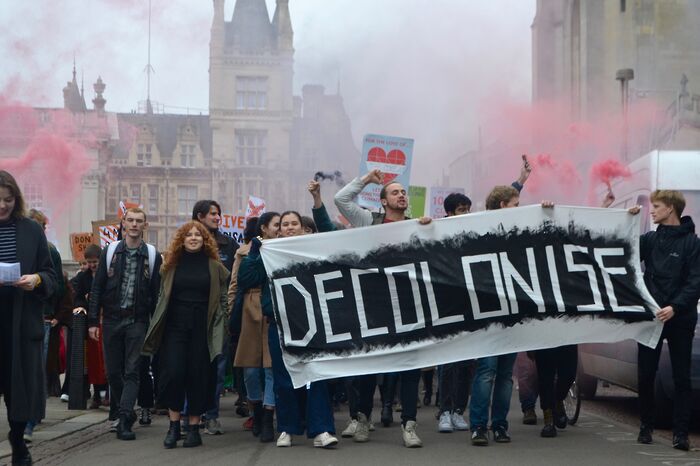Cambridge’s environmental justice movement so far
This week marked Cambridge’s first Green Week. What has the student environmental justice movement been like over the past year?

Last term saw the divestment movement branch out into demilitarisation and decolonisation campaigns, and dig deeper into Cambridge’s colleges.
College divestment campaigns have sprung up, as a response to the University Council’s landmark decision to reject full divestment from fossil fuel industries, and the successful case of Queens’ College divesting their entire endowment from the sector.
In November, a joint Varsity investigation with Cherwell revealed significant holdings in oil and gas industry of some colleges, with Trinity College topping the list with £9.1m invested in the industry, including £1.2m invested in Royal Dutch Shell.
Around 250 students marched through Cambridge in a mass rally, calling on the University to “divest, disarm, decolonise”, linking up divestment and demilitarisation calls with the decolonisation movement.
Zero Carbon Society launched banner drops at multiple colleges in last November in a call for college divestment and disrupted the Shell annual lecture, where a member of its executive committee was due to speak.
Following University Council’s decision and the intense lobbying of last year, the divestment movement has consequently turned to new tactics in an attempt to continue pressuring the University. Shocking revelations uncovered how deep fossil fuel and oil exploration industries are entrenched in the University’s institutions, affirming campaigners’ strategy that colleges are worthy targets as they, like the central University, also bear high stake investment in these industries.
With CUSU’s first ever Green Week, which focuses on climate justice and demands for University divestment, launching this week, it is worth examining the premises for divestment, the links Cambridge currently has with companies in these industries, as well as what it could mean for the University and colleges if they divest.
What are the premises for and against divestment?
Campaigners for divestment say that Cambridge’s investment in the fossil fuel industry leads to the “institution’s legitimisation of the destructive actions of arms and fossil fuels companies.”
“This University must cut all ties and it must act now, otherwise it can have no hope of addressing its colonial past and present”, as Varsity was told during the rally last term. Divestment is tied up with decolonisation, as the destruction of environment is brought in parallel view with protests against the exclusionary framing of knowledge and interpretations across subjects, with both seen as legitimisation of exploitation.
The Cambridge Decolonisation Network told Varsity that the ecological abuse of colonised regions and peoples are “inextricably linked” with climate change, thus “any movement that seeks to avert climate change’s most disastrous consequences needs to be a decolonial movement”.
The Network stressed that the research and teaching conducted at Cambridge “reinforce worldviews that fail to challenge, or even mention, these injustices” of the plundering of natural resources from colonial sites. They argued that collaboration with the divestment movement enable both movements to “inform and enhance each other, building a coherent idea of how the University must be responsible for its actions”.
For colleges who have investments in the fossil fuel industry, many cite the difficulty to divest in their indirect interaction with investment and charity laws. As a Varsity investigation revealed last June, for many colleges, external managers choose which companies to invest colleges’ endowment in, with colleges being able to influence their choices by establishing ethical investment policies.
Another concern lies in the fiduciary duty of charities, which requires charities to maximise returns from their investment. The duty does allow charities to accept lower returns when investments conflict with the aims of the charity or will cause it to lose supporters. Colleges cited the difficulty in defining conflicts with its aims. Meanwhile, campaigners often argue that the University’s goals of bettering the world conflict with using profits from environmental destruction.
Not many colleges have ethical investment policies, while for those who do, they are often vaguely worded. Caius, Girton, and Jesus require “integrity” from their managers while only two policies defined specific investments that are in conflict with its aims.
Campaigners argued for divestment in large part on ethical grounds, citing the symbolic condonation on these companies’ destruction on the environment and practical influences on research direction.
Zero Carbon organised several protests last term, including the rally with demilitarise and decolonise campaigns, banner dropping in multiple colleges, and disruption at the annual Shell lecture last year.
In the University Council’s rejection of the working group’s divestment plan last year, it stated “negligible” exposure to the fossil fuel industry in its investment, with “no exposure to the most pollutive industries” in their directly-held investments. The Council also argued for diversity in the University’s investments, saying that “it is inevitable in a diversified and indirectly managed investment portfolio that some exposure may appear in some funds and therefore it is not possible to demand absolute exclusion”.
The Council further stressed on the need for strong investment returns to support research in their rejecting of the working group’s suggestions.
What links does Cambridge currently have with the fossil fuels and arms industry?
The BP Institute, established in 2000 with an endowment from BP, which funds faculty positions, support staff, and the Institute Building, conducts research on multiphase flow and other energy research.
The Institute currently offers a fully funded PhD studentship and the PhD CASE Award on Natural Ventilation.
Energy Research at Cambridge holds the Shell annual lecture. The lecture was held last term and was disrupted by Zero Carbon activists.
Shell funded PhD students and early researchers in Cambridge in 2016, as evidenced by a research presentation in the 2016 Shell lecture.
The Department of Chemical Engineering and Biotechnology has ongoing partnerships with Exxonmobil, BP, Boeing and more companies.
The Cambridge Service Alliance, established in 2010 by BAE Systems, IBM, the University of Cambridge’s Institute for Manufacturing and Judge Business School, collaborates with corporations such as Caterpillar, a manufacturer of oil and gas extraction equipment such as industrial gas turbines, natural gas and diesel engines, to conduct research on business models and support.
Gold membership of the Alliance can “influence the direction of Cambridge Service Alliance research through participating as a member of the Steering Committee”, gain “facilitated access” to Cambridge experts in relevant fields, and be associated with the University, according to the 2018 brochure of the Cambridge Service Alliance.
The Cambridge Judge Business School has collaborated with Lockheed Martin, a weapons manufacturer, on cyber resiliency research in 2016.
Past Cambridge financial statements showed subsidiaries of Royal Dutch Shell – Shell Global Solutions International, Shell International Exploration and Production, and Shell Research Inc – have funded a number of grants across University departments, totalling over £2.6m in project funding between July 2012 and July 2017.
Professor Andy Woods, Head of the BP Institute, said in a comment to Varsity that the Institute engages in “a very wide range of fluid mechanics research related to a wide range of flow phenomena at different length scales from microscopic flows to large scale geophysical flows”.
He emphasised that the research carried out by the faculty of the Institute “is driven by their [fellows’] intellectual curiosity” and there is “total academic freedom” in their choice of research.
A spokesperson of the University told Varsity that the University “recognises that climate change is a real and present danger”, thus “have encouraged an exhaustive debate on divestment at the University”.
They continued that the University is currently “primarily focused now on implementing the numerous and wide-ranging commitments it has made in response to the DWG [Divestment Working Group] report.”
“The conversation and the University’s efforts to engage with society at all levels in order to contribute to a more sustainable future through teaching, learning and research will carry on indefinitely.”
The University declined to confirm whether Shell currently funds academics or not, citing the data being unavailable.
What could it mean for the University and colleges to divest?
In divesting from fossil fuel and arms industries, the University will be symbolically and practically distancing itself from fossil fuel extraction and the environmental and human rights impacts from those activities. This means that the University’s research is not affiliated with the profits these companies acquired from environment damage and the arms trade, thus removing any implicit endorsement and support.
Campaigners have consistently argued for greater transparency in the University’s external research collaborations, to allow for proper scrutiny.
Organisations of the University, such as Cambridge Enterprise, actively manage corporation collaboration requests and help researchers realise commercial potential of their work. Meanwhile, four departments across STEM subjects, the School of Clinical Medicine, the Computer Laboratory, and the Judge Business School directly support research collaboration.
What could happen next?
CUSU’s Green Week marked a new chapter in the environmental justice movement in the University, with a focus on individual action as well as structural change. It presents students with a localised narrative emphasising the relevance of divestment to them under the backdrop of tight-knit communities of their colleges.
Updated, 25th January 2019: This article has been updated to include comments from Professor Andy Woods and a University spokesperson
 News / Clare Hall spent over £500k opposing busway 24 December 2025
News / Clare Hall spent over £500k opposing busway 24 December 2025 Comment / The ‘class’ of Cambridge24 December 2025
Comment / The ‘class’ of Cambridge24 December 2025 News / Caius mourns its tree-mendous loss23 December 2025
News / Caius mourns its tree-mendous loss23 December 2025 Comment / Yes, I’m brown – but I have more important things to say22 December 2025
Comment / Yes, I’m brown – but I have more important things to say22 December 2025 News / Girton JCR publishes open letter expressing solidarity with Palestine25 December 2025
News / Girton JCR publishes open letter expressing solidarity with Palestine25 December 2025











